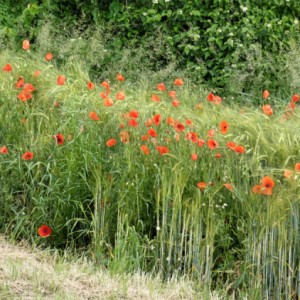Co-Op Dried Grass
Tractor Tuesday: It's a big Fendt pulling this load of dried grass, not hay. It is one of the products produced by the "Futtertrocknungsanlage Erkheim" (feed Drying Unit, Erkheim) which is a lot closer to houses in our parish Sontheim than Erkheim.
I don't know enough about the Carbon footprint of the unit to make any judgement as to how sensible the entire matter is, but I can try to relate some of its history which started in 1973.
In 1972, some researches and businesses, including Fendt tractors, came up with the idea that by artificially drying grass using cheap oil and turning it into dried pellets, one had a weather independent method of producing high protein cattle food. On 19th March 1973, 151 local farmers met in the pub & started a cooperative, buying a total of 276 shares of DM 1,500 (€750) each. No sooner was the cash in the bank than the Middle East oil crisis hit & everything was put on ice.
In 1974 there was a worldwide protein shortage & the EEC (EU) decided to give grants for producing protein-rich animal feed which would also make Europe less dependent on the USA. It looked like the idea could be saved. At the same time, research of the existing units in operation now for a few years was showing great benefits to milk production & cow fertility. The idea got a new lease of life and with financial help from the Bavarian State, the go-ahead to build was given & the unit was ready for full production in spring 1979.
And in general, it hasn't looked back - it survived great criticism from the Greens in the 1990s by investing huge amounts in filter scrubbers & somehow all the various oil crises.
The same principal applies to all their now extended range of services. Farmers get back the worked raw product that they deliver unless they sell the raw product to the business for them to sell on. I think about one-third of farmers deliver the product themselves, two-thirds have it collected by the units own fleet of tractors & loaders. Each farmer has to collect his own finished product though.
At the end of the season, the costs are worked out & divided out amongst the co-op members according to shares & usage. The solidarity principle applies so that grass mown & delivered during a rain storm costs the same as that delivered after lying on the ground for 24 hours in a heat wave. Similarly, the cost of collecting the raw product is the same for those 1km or 20km away.
The range of products:
:
Grass pellets & bales
Corn/Maize pellets
Straw bales
My thoughts would normally be whether this all makes sense doing things that nature used to & still can do. The website does give some information that says the speedy "conservation" process maintains much higher %s of protein & vitamins. Certainly, it is a big time saver for farmers & a guarantee of feed supply.
Sadly there is no information on how the plant runs & manages its energy use. There are masses of PV units on the rooves of the buildings and field alongside. There is a bio-gas unit alongside. I'm sure the heat generated is somehow recycled & no doubt it is very efficient. Haven't heard any complaints from the Green movement.
Things are moving on - I believe one of the heads of the co-op has built a "cold" drying system on his own farm which presumably is more like hay - he is very much into organic farming.
Personally have to say we have used their services ourselves with grass pellets for the horses and in one memorable moment back around 1996, we took over a long-abandoned field which had previously been grazed by cows surrounded by barbed wire.in the field and our farmer friend who was a member of such a co-op, mowed it for s & got it made into pellets - part of the process is that before being chopped & dried, the grass goes over a magnetic field. They said they had never had so much metal in a load of grass!
On the morning walk when we spotted the dried grass, also to my great delight (extra photos) found the only field I know of in the area growing what I think is called "GPS" here, a complete mix of cereals & plants including peas & beans and full of flowers. This will probably end up as silage. In the background of this photo, the drying unit bellowing out steam - not smoke.
And close by, sadly only on piles of rubbish or on corners where the chemical sprayers don't reach, a wonderful collection of poppies.



Comments New comments are not currently accepted on this journal.